"Go to our priest, he will tell you everything"
Panacea from all troubles
From where in the village appeared the healer, is unknown. Remains a mystery and its past. According to the documents, a certain Zhuzhanna Olakh came to Nadrev in 1911. Since that Hungarian village was backward and wild, the skills of a midwife and healer were very useful for local women. After all, there were no doctors in the village. A "fad" Fazekash was considered abortion. They, by the way, were banned in Hungary, so the midwife was doing this secretly.
Before the beginning of the First World War, life in the village went on as usual. Olah was respected by the locals, although they knew practically nothing about her past. Only once did Fazekash open up. She said that she was forcefully married to an unloved person and, after his disappearance (or death), experienced only relief. In general, Julia treated men very badly, considering that they should all be sent to the next world.
Now we need to make a small clarification. According to one version, Olakh had a husband - Julius Fazekash. Either she moved with him to the village, or while already in Nadrev, she married him - is not known for certain. The second version says that Julius is just a namesake. One way or another, this particular man became the first official victim of Olah. After he had lunch with a stew, Julius was gone. We will return to this incident a bit later.
The First World War began. Local men went to the front, in the village there were women, children and old people. In the meantime, a prisoner of war camp was set up near Nadiřev. Accordingly, there were many male foreigners. Women from the village more and more often began to visit that "institution". And soon the skills of Fazekash turned out to be extremely in demand. Hungarian women didn’t know about contraception, or simply didn’t use them, but almost all of them were expecting children. But no one was going to give birth, women increasingly began to knock at Olah’s house. She did not refuse anyone, she liked her illegal activities.
For the time being everything was quiet. But then men began to return to the village. Someone on vacation, some for health reasons. That's when the problems started. Somehow deceived husbands learned about the betrayal of their wives. Began the proceedings, beatings. Frightened women turned to Fazekash for help. She again went to meet. Only this time, Julia offered poison as a panacea for all ills. She prepared it from belladonna alkaloids with the addition of arsenic. The last ingredient Fazekash managed to get from the sticky paper used for catching flies. She advised the substance to be added to food or wine. At first, the women did not believe her. And here again Julius Fazekash “emerges”. According to one version, she poisoned her husband to demonstrate the deadly effects of poison. According to another, the woman simply confessed that her husband was not missing, but was poisoned by this very drug. Residents Nadeva liked this solution to the problems.
Men in the village began to die, as they say, like flies. Using the poison Fazekash, women began to poison not only their husbands, but also annoying lovers, fathers and unwanted sons. Some, thus, got rid of unnecessary relatives in order to get an inheritance, others - threw off the heavy burden of the family nurse. And none of the poisoners did not consider herself a criminal and did not repent of their deeds. According to them, in those difficult times they simply had no choice.
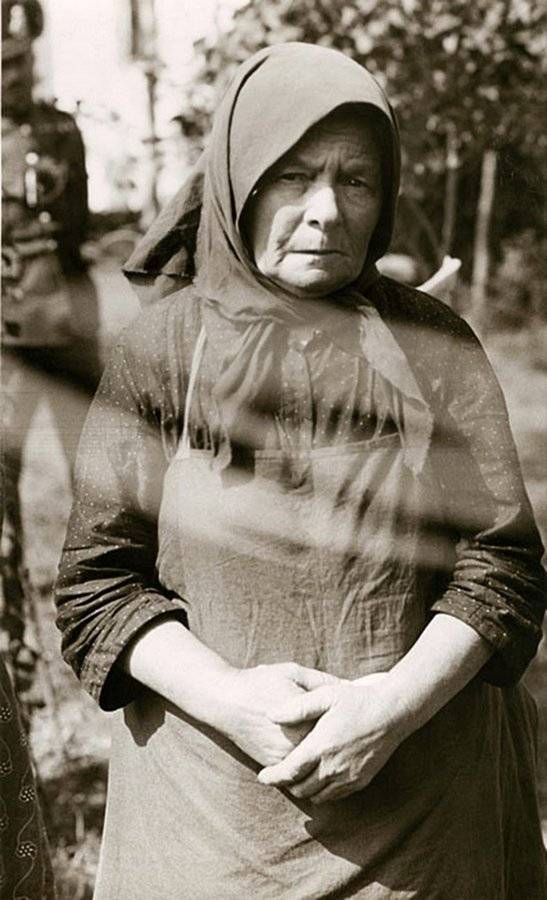
The local authorities, of course, were very concerned about what was happening in Nadrev. And the residents of neighboring villages called that locality "the murder district". But there was no reason for the police to start the investigation. The fact is that the accomplice Fazekash (according to another version is a cousin) was engaged in filling out death certificates. And he, more often than not, indicated a reason quite plausible for that time — drunkenness.
And Fazekash began to enjoy increasing popularity. For her magic panacea for all troubles began to turn women from neighboring villages. But she especially liked the potion of the Sage woman Tassakurta.
Investigation
In the fall of 1929, police officers in the Szolnok administrative district received an anonymous letter. It was described in detail about all the strange events taking place in the villages Nadrev and Tassakurt. The police chief, although he considered that this message was just someone's unsuccessful joke, but decided to send two investigators there for verification. And, as subsequent events showed, his intuition did not let him down.
Policemen Bartok and Frieshku also felt that they were dealing with a silly joke, but they were serious about the matter. Arriving in Nadev, the men first of all decided to visit the local tavern, because it was the easiest place to collect all the rumors. Since the time was earlier, in the institution were only four visitors. After they met and a few glasses of wine, the police began to question about life in the village, carefully mentioning oddities such as increased mortality among the male population. As soon as they only stammered about it, visitors to the tavern became sharply serious, and fear appeared in their eyes. Of the four, only one agreed to honestly answer the questions of the police, and his comrades hastily withdrew. But the full interrogation failed. The man suddenly said: "Go to our priest, he will tell you everything." And after that, too, left the institution. And the cops got food for thought. The jaunt to Nadev, as they imagined her, suddenly turned out to be a serious task confirming their fears.
Find a priest was not difficult. Like visitors to the tavern, barely the police started talking about dying men, it became gloomy and frightened. He led Bartok and Frieshka into the room, closed the door and said: “We live here in the shadow of death. For no apparent reason, strong healthy men die suddenly. This spring, when the father of Mrs. Sabo died, it was rumored that he and Zhuzha Olakh had poisoned him. I went to see Mrs. Sabo and asked her a number of questions. She, of course, refuted the rumors, but before I left, she treated me to a cup of tea. An hour later, I felt very bad. A medical friend who came to me was sure that Mrs. Sabo had poisoned me. ”
Then the priest said that there were neither doctors nor policemen in Nadvir and Tassakurt. And the death certificate is signed by a single medical assistant, who was Olah, either a relative or just an accomplice.
After that, the priest paused for a bit and continued: “In her face you will find a formidable opponent. And if your visit seems dangerous to her, you will die. Superstitious peasants are afraid of her and the midwife Julia Fazekash. They believe that these women have supernatural powers, and since Fazekash is a midwife and Olah is a nurse, they have access to virtually every home. ”
So the police learned that there are two women behind the strange events taking place in the villages - Zuzsa Olah and Yulia Fazekash. The first name was familiar to them - it was mentioned in an anonymous letter, and the second they heard for the first time. To the question: “Why do they do this?” The holy father replied: “I believe that initially these killings were caused by the poverty of our poor peasantry. People with disabilities, the elderly, and children have sometimes found themselves an unbearable burden for our poor. Then it was the turn of drunks who beat their wives. These people gradually disappeared. In these places, women led by Olah and Fazekash took the upper hand. In these villages, women are completely dominated. And men are afraid for their lives. ”
The police promised the priest to sort things out and left the church. Before leaving, Fryeshka quit: “Since we are here, they have nothing to fear,” not knowing yet that the thing they, one might say, accidentally got involved, is much more serious than men could imagine.
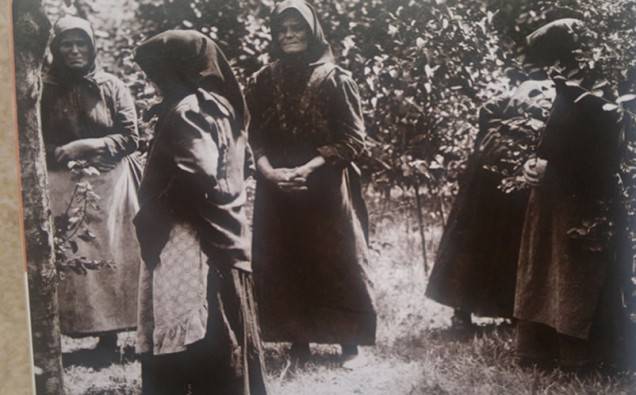
Silence reigned in Nadjora. Bartok and Frieshka walked slowly and silently through the deserted village, lost in thought. Suddenly, they heard wheezes and moans, as if someone was choking. Pulling out the pistols, the police ran to the sound. Jumping around the corner of the house, they were near the tavern. Suddenly, Fryeshka stumbled and fell. Bartok stopped, staring at the “object” that his partner had stumbled upon. It was the same man who sent them to the priest. The people who lived near the tavern, of course, did not see anything. Moreover, none of them heard the rattles and groans of the deceased. And, despite the blank wall between the police and the villagers, Bartok and Frieshka managed to find out that the man is his uncle ... of Mrs. Sabo, about whom the holy father spoke. Apparently, the woman somehow learned that her relative does not know how to keep her mouth shut, and killed him, one might say, in front of the police. Apparently, in this way she wanted to frighten the law enforcement officers, but Sabo miscalculated. For men, the investigation of this case in an instant became a matter of principle. They wanted to take revenge on the man-haters - within the law, of course.
The body of the deceased was delivered to a paramedic. The man briefly examined the body and gave the police a conclusion. It was written in black and white: "He died from alcoholism." The last doubts were dispelled. And the police decided to play along with Mrs. Sabo. They pretended to leave, and in fact began to monitor the locals. But there was no point in this. Either Sabo somehow found out about the plan of the police, or she simply paused before the new murder. And then Frieshka decided to try the “knight's move”. He broke into the house of a woman (Bartok was covering his partner from the street at that time) and, pointing a gun at her, accused of killing his uncle. This Sabo did not expect. Taken aback, she wept and confessed to the murder, not only of her uncle, but of her father and brother. But Frieshka continued to hold her on the gun. Then the woman reported that she had bought poison from Fazekash. In addition, Sabo called several women who also got rid of their men. Olah was among them.
The police arrested six women and took them to the station in Szolnok. During the journey, Sabo managed to recover herself, so she kept calm during the interrogation, refusing previous testimony. She stated to the police chief that Frieshka forced her to confess to the killings and peck at others by force. The rest of the ladies behaved as calmly and restrained. They reacted the same way to the accusations - they rounded their eyes and shrugged their shoulders. While interrogations were going on, the police searched the suspects' houses. But no evidence was found. Therefore, the women were released. An exception was made only for Mrs. Sabo. She remained under arrest as the main suspect.
Frieshka and Bartok, as well as several other policemen, returned to Nadryov late at night and dispersed around the village. They did this on purpose so that nobody would notice them. And they were not mistaken. Bartok was the luckier one. He saw a woman come out of her house, presumably Fazekash or Olah. Having got involved after him, the policeman witnessed curious scenes. It turned out that at night a woman went around her poisoning clients and urged them not to talk to the police. And Bartok, meanwhile, wrote down the house numbers in a notebook. So the police got a list of killers. At the same time, the law enforcement officer decided that he needed to look at the local cemetery in order to conduct the exhumation of the bodies of the men who had died lately. If you can detect traces of poison, you can safely send the case to court.
Exactly the same thought occurred to Fazekash (and maybe Olakh, because Bartok himself did not know yet whom he was watching). The woman, together with the podelitsy, went to the Nadrevsky cemetery. Hiding behind one of the numerous tombstones, the policeman watched as the villagers took shovels and ... No, they did not dig up the corpses. Women decided to do more cleverly. They began to swap tombstones and stones. If their plan had worked, the exhumation of the bodies would not have given anything, because under the plates with the names of the supposedly dead men died the natural deaths (such people also met in Nadrev).
Pay
Bartok whistled and, pulling out a pistol, jumped out from behind his cover. Women, abandoning shovels, froze, staring in dismay at the law enforcement officer. Only one tried to escape - Fazekash. She desperately resisted, but still could not cope with the police. And soon the rest of the law enforcement officers came to him for help.
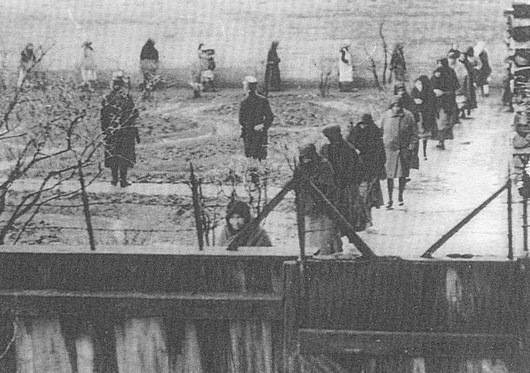
The following morning, an exhumation procedure was performed. Experts and doctors from Szolnok worked for several days, finding more and more new bodies with traces of arsenic. Among the dead were not only adult men and old people, there was even a child. Found experts and the body of Julian Fazekas. But Bartok and Frieshka felt like real heroes, because it was the two of them who managed to solve the case of the Nadirevskiy Poisoners. Then everyone learned that Julia Fazekash and Zuzha Olah are one and the same person. She deliberately hid under two guises (there is a version that the woman changed clothes and made up) in order to confuse both local and her female partners, and representatives of the law.
Despite the success, the police and experts still had a lot to do. After all, they checked only the cemetery Nadireva. Ahead of them was waiting for the burial place of the inhabitants of the neighboring village ...
This version of the incident adheres to the American and Hungarian historian Bela Bodo. And there are two more scenarios. The first one says that Mrs. Sabo was captured by two men who managed to survive the attempted poisoning. They brought her to the police. In the third version, the main character is a medical student from a neighboring village. He accidentally stumbled upon several battered male bodies. I did the analysis and found arsenic in the remains. The police became interested in this and started an investigation.
During the investigation, a total of eighty women and two men were arrested by the police. And thirty-four residents of Nadireva and one inhabitant, that same medical assistant, appeared before the court. Of these, sixteen people were sentenced to various terms of imprisonment, and another eight were sentenced to death. But, in the end, only two were hanged - Sabo and Palinka. Fazekash did not live up to the gallows - using the police mistake, she committed suicide. In general, for all the time while the investigative process was going on, the woman said almost nothing. She did not try to justify herself or explain why she needed to incite the villagers to kill. Therefore, the motives of the criminals remained unclear for the police. Her accomplices claimed that Fazekash thus avenged her father and first husband for humiliation and constant beatings. They said that as if she had even sold her soul to the devil so that he would help her bring all the men to the grave. He agreed and shared with her a recipe for poison. But this, of course, is only speculation of the arrested women, who by all means tried to shift all the blame to Fazekas.
Mrs. Sabo was hanged for killing her father, uncle and brother. On Palinka there was blood in general of all her relatives. In a short time, she poisoned her parents, both her brothers, one of the daughters-in-law, and also her aunt. She carried out all these murders for the sake of a new house and a land plot.
The events that took place in Nadvir are the basis of the feature film “Hiccup”, as well as the documentary film “Angelodels”.
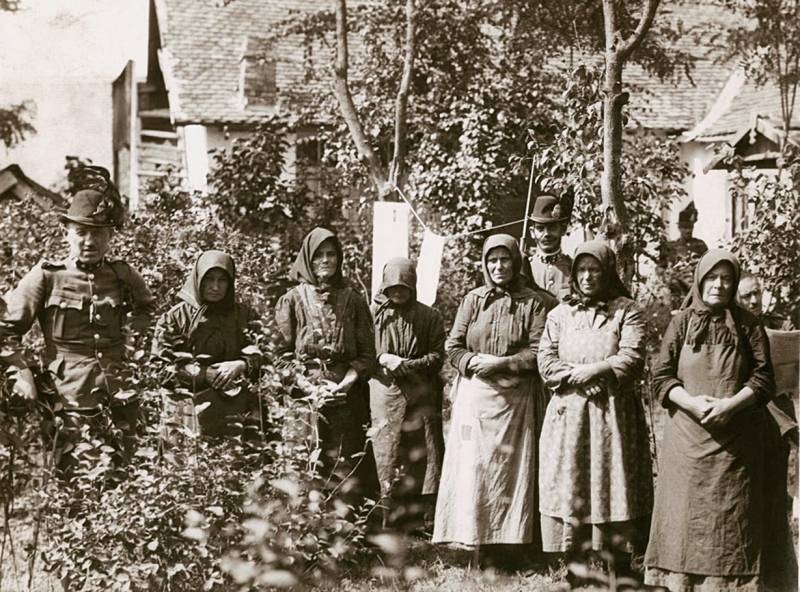
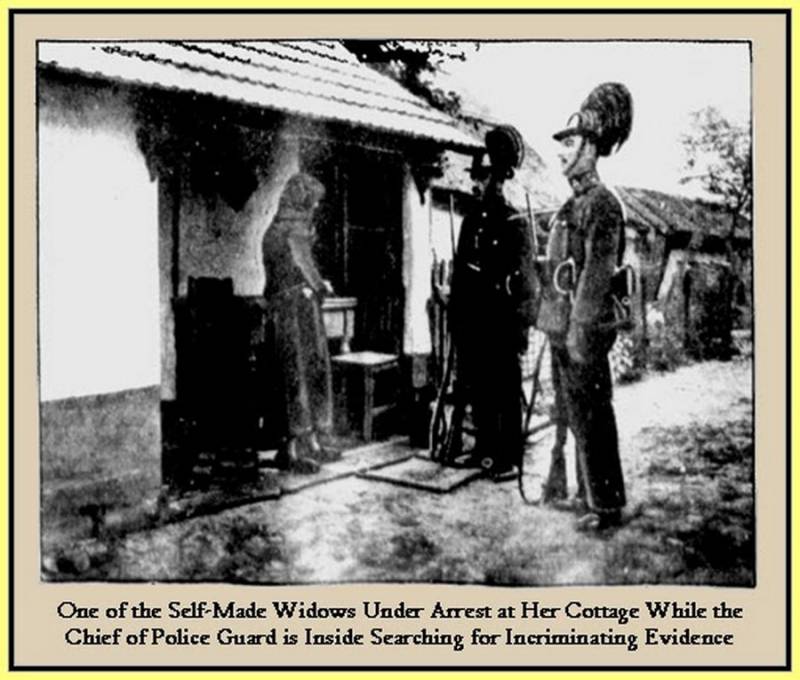
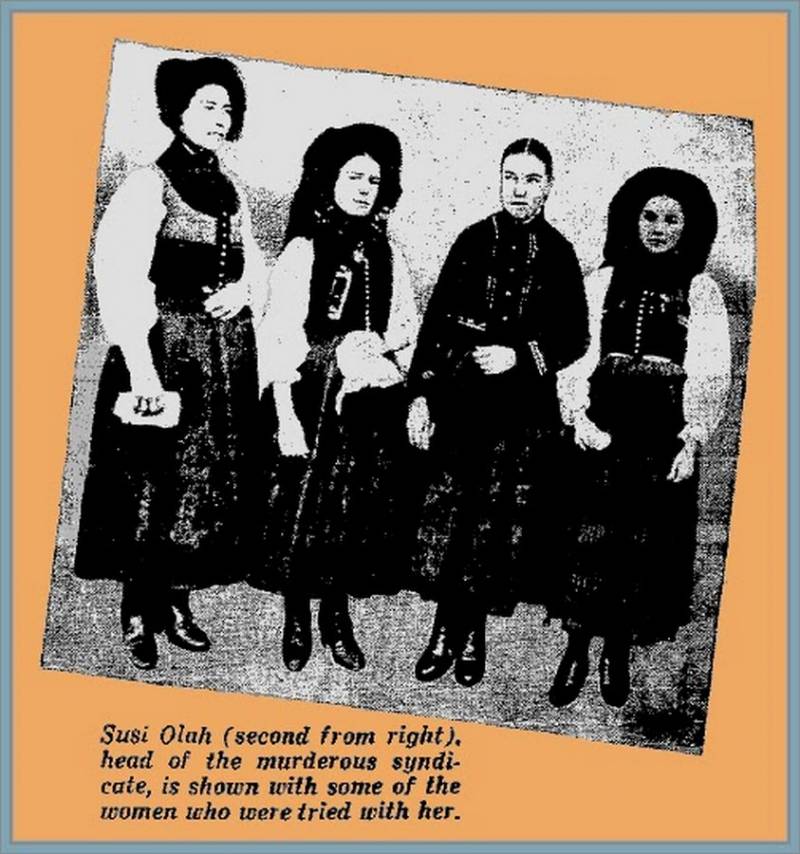
Information